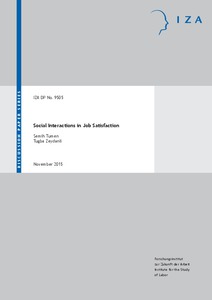Social interactions in job satisfaction

Tumen, Semih ; Zeydanli, Tugba
Institute of Labor Economics, Bonn
IZA - Bonn
2015
46 p.
job satisfaction ; labour market ; productivity ; work environment
Discussion Paper
9505
Working conditions
English
Bibliogr.
"The literature documents that job satisfaction is positively correlated with worker performance and productivity. We examine whether aggregate job satisfaction in a certain labor market environment can have an impact on individual-level job satisfaction. If the answer is yes, then policies targeted to increase job satisfaction can increase productivity not only directly, but through spillover externalities too. We seek an answer to this question using two different data sets from the United Kingdom characterizing two different labor market environments: Workplace Employment Relations Survey (WERS) at the workplace level (i.e., narrowly defined worker groups) and British Household Panel Survey (BHPS) at the local labor market level (i.e., larger worker groups defined in industry x region cells). Implementing an original empirical strategy to identify spillover effects, we find that one standard deviation increase in aggregate job satisfaction leads to a 0.42 standard deviation increase in individual-level job satisfaction at the workplace level and 0.15 standard deviation increase in individual-level job satisfaction at the local labor market level. These social interactions effects are sizable and should not be ignored in assessing the effectiveness of the policies designed to improve job satisfaction."
Digital
The ETUI is co-funded by the European Union. Views and opinions expressed are however those of the author(s) only and do not necessarily reflect those of the European Union or the ETUI.